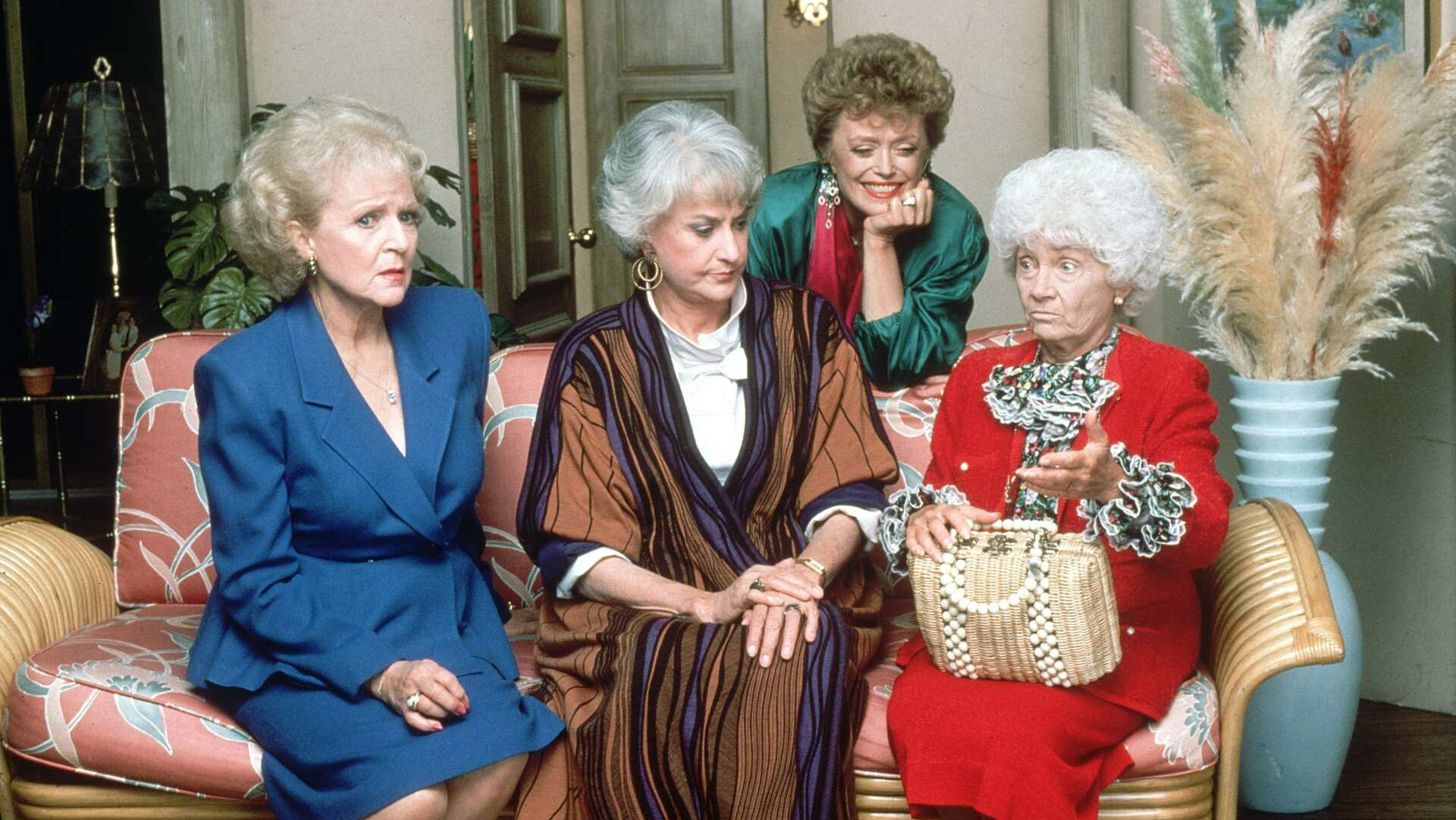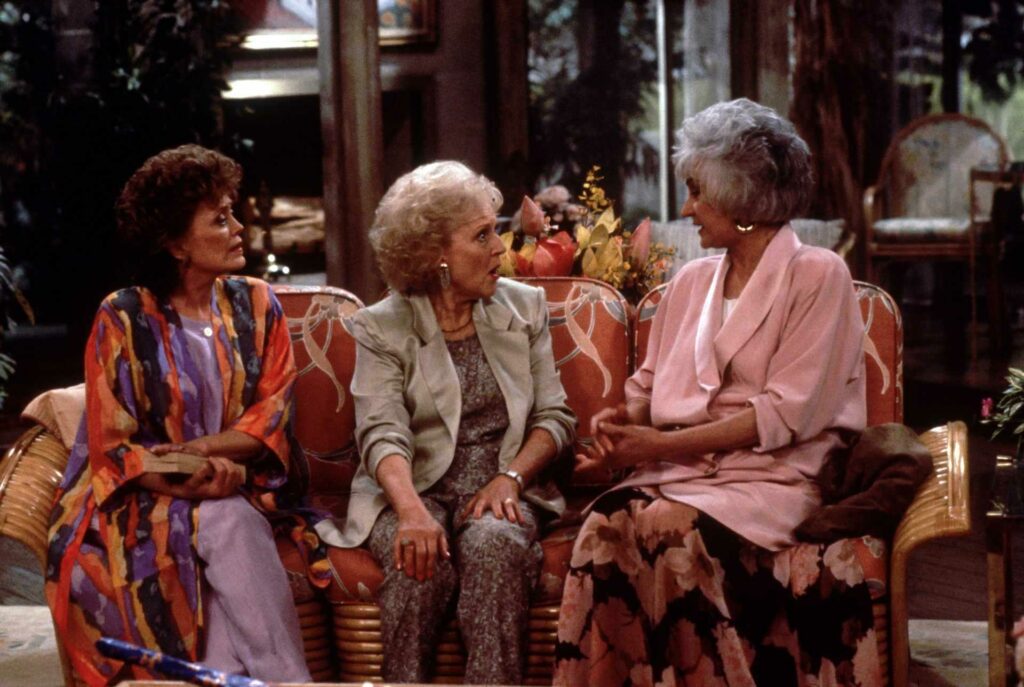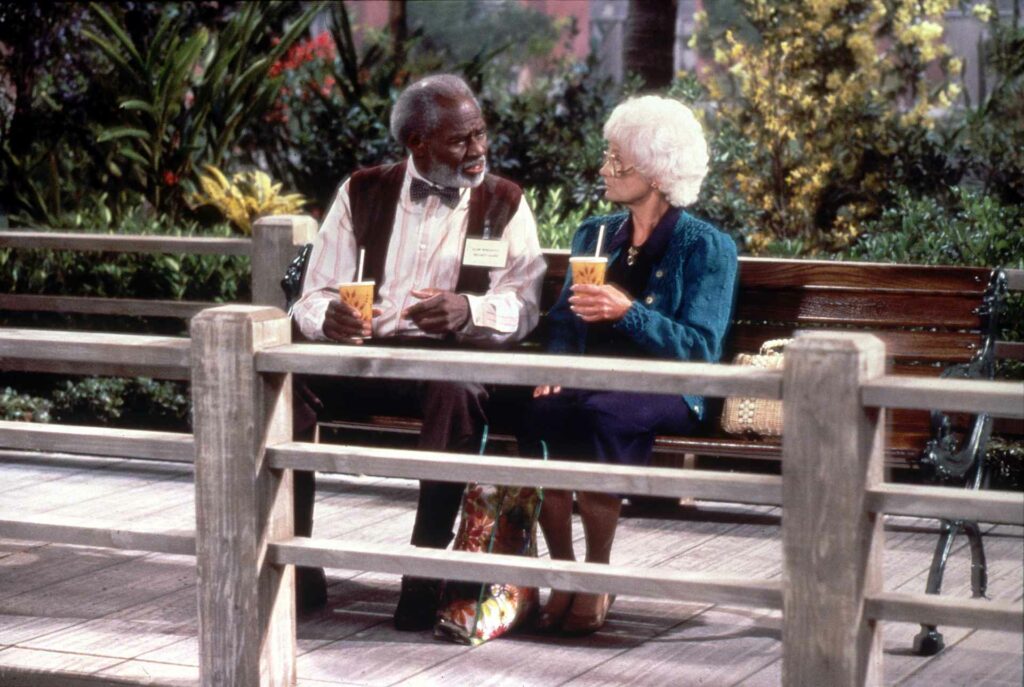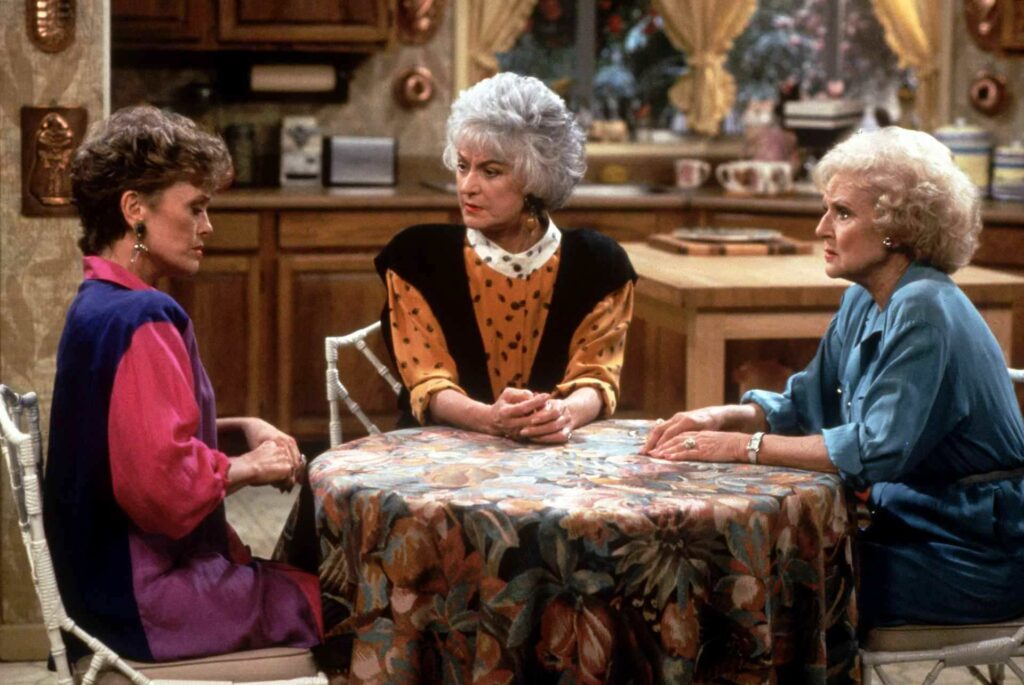The Golden Girls at 40: Attitude celebrates this queer cultural touchstone
It’s 40 years since US sitcom The Golden Girls made its debut across the pond — so why is a show about single women on the wrong side of 50 such an enduring hit with our community? With witty wisecracks, camp humour and LGBTQ+ themes ahead of its time, it had plenty to draw us in. Here, we look back at how Dorothy, Sophia, Blanche and Rose became the ultimate chosen family…

The Golden Girls was born, appropriately enough, out of a joke. During a 1984 promotional programme for NBC, comedian Selma Diamond did a one-minute skit in which Miami Vice became Miami Nice, where “a bunch of old people [sit] around playing pinochle.” The joke, surprisingly, resonated with commissioners: “On television, you’re always looking for the handsome, 35-year old leading man with a sense of humour… and he’s impossible to find,” NBC vice president Warren Littlefield told the New York Times. “At least we could cast Miami Nice.”
In what was a rare occurrence, the network itself commissioned writers to create the idea they’d had: a show about older women living in Florida. “Take some women around 60,” Littlefield told producers Paul Witt and Tony Thomas. “Society has written them off, has said they’re over the hill. We want them to be feisty as hell and having a great time.” Suspicious this was all for nothing, Witt and Thomas were surprised to have 13 episodes commissioned on the spot. Then came Susan Harris, who was at that point most famous for writing the controversial episode about abortion for 70s US TV show Maude (by coincidence its lead character was played by Bea Arthur, who would play Dorothy in The Golden Girls). Harris had just spent four years burning out writing US TV show Soap almost single-handedly. “I’ve never gotten excited about a network idea before, but this was compelling,” she told the New York Times at the time. “I could write grown-ups.”
The Golden Girls pilot was the most watched show of the week. “In all the hundred years I’ve been in this business, I’ve never seen this kind of pre-hype,” said Betty White (who played Rose) at the time. Though a politically progressive sitcom about horny women over 50 might feel like the little engine that could, that’s not the case at all: everyone wanted it. Advertisers poured millions into ad space around it, knowing that even young people would be into it, and the rest is history. The Golden Girls was so celebrated it became the only sitcom where all its leads won an Emmy. It also produced some of the great showrunners of our time, including Desperate Housewives’ Marc Cherry and Arrested Development’s Mitch Hurwitz, who wrote the finale.
For those unfamiliar with the show, whose seven seasons aired from 1986 in the UK, a précis: caustic divorcee Dorothy, Southern saucepot Blanche (Rue McClanahan), and benign dolt Rose all live in the same Floridian house, talking matters of life, death and sex around the kitchen table or out on the veranda. Dorothy’s mother Sophia (Estelle Getty) — a cockblocking battleaxe with no filter — ends up joining them when her retirement home burns down. In the pilot, there is also a gay houseboy called Coco, but he was cut when the network realised the show didn’t need a man to ground it.

Across the show’s run, the four women sleep with an impressive number of men, go from convenient housemates to chosen family, and prove that the second half of life can be just as messy, fun and confusing as the first. But what makes these characters more than just cheap pantomime filler is how richly drawn they are. Blanche may be a flirt, but she’s also a woman bereaved, and her relationship between her past and present selves is both hilarious and touching. Dorothy has an adamantine shell and a library of wisecracks but her divorce, her chronic fatigue, and her gambling addiction are all portrayed beautifully. Sophia may be more punchlines than protagonist, but actually her fears of being so much closer to the end of her life give her a nuanced relationship with her daughter. (An ironic plotline, considering she was both younger than Arthur and was apparently petrified of death.) Though Rose is often seen as a soppy bumpkin with no common sense, she’s also a former housewife with a painkiller addiction who is trying to rebuild her life after almost 40 years dedicated to a man’s needs. Her panic at having to become autonomous so late in life often makes her the most perceptive member of the cast. When she tells Dorothy that “our families are gone, and we’re alone. And there are too many years left, and I don’t know what to do,” it cuts right to the centre of why this show is not just hilarious and horny, but incredibly moving too.
It makes sense that the show, written by one of TV’s most topical writers, mixed big, evergreen themes with the important issues of the day: one storyline finds Rose fearing that she has HIV after a blood transfusion, while Sophia’s panic about how contagious it might be is used as a clever audience surrogate. In another episode, Sophia helps the socially conservative Blanche come to terms with her gay brother getting married by explaining that everyone deserves someone to grow old with. While there are other episodes that also show remarkable deftness, others have not aged quite as well: the fact Dorothy’s husband impregnated her while she was unconscious is played for laughs. Another episode has been removed from streaming services due to accusations of Blackface, with critics of the episode arguing that there has always been a problem with how The Golden Girls talked about people of colour. It was the 80s, but one has to be able to look at both the rough and the smooth when a show is deified as progression incarnate.
There is one group that has always loved The Golden Girls: gay men. As Betty White told Parade in 2010: “Gays love old ladies.” Jeffrey Duteil, who wrote ‘Isn’t It Romantic?’ — the episode featuring Dorothy’s new lesbian friend — says that even during the first season, The Golden Girls would be put on when getting ready to go clubbing, and that gay bars would even tape the episodes and have viewing parties with themed cocktails. “I think back then, when AIDS was rampant and coming out was still a big deal, the gay community really felt these characters were an extension of their own communities,” he told podcast Gayest Episode Ever. “They were accepting and funny and bitchy. The best fag hags a guy could have.”
Bea Arthur and Betty White, in particular, were staunch queer allies outside the show as well: White was an advocate for the Elton John Foundation, and outspoken in her support of gay marriage. Arthur supported the Ali Forney Center for homeless queer youth and left them a considerable sum of money when she passed; they have since opened a centre in her name.
Arthur was also the main driver of the show’s demise. Bored of her character being the butt of appearance jokes and displeased with the writing quality in the later episodes, Arthur quit after seven seasons. The other cast members carried on to a sequel, The Golden Palace, which sees them run a hotel where Don Cheadle plays the manager. It lasted 24 episodes.

While The Golden Girls had an ardent fanbase while it aired and has remained a beloved artefact of the gay community for decades, I came to it much later. In part because, to me, it seemed to exist as something flat, obvious and chintzy. When people spoke about Dorothy, Rose, Blanche and Sophia to me, I didn’t get the impression that the show was particularly well-written, subversive or well-acted: “THIS SHOW IS NOT JUST HILARIOUS AND HORNY, BUT INCREDIBLY MOVING TOO” GILT TRIP: Rose (Betty White), Blanche (Rue McClanahan) and Dorothy (Bea Arthur) WILLAM COSYING UP: Estelle Getty played Dorothy’s mother, Sophia, in The Golden Girls DISNEY+ I just got the sense that it was a bit of a cult hit that gay men had turned into a personality quiz. When I did eventually watch it — years after its original broadcast — I realised how wrong I was.
Despite having all the affectations of an era of network television that I didn’t grow up in, I’d never seen a show with such tight scriptwriting, so many gags a minute, and which was able to oscillate between the existential and the slapstick with such ease. It’s almost so good that I can’t comfort-watch it — it deserves to be consumed as slowly and consciously as great cooking. But then I had to wonder why it had developed the sort of two-dimensional legacy it always seemed to have in popular consciousness. That, to me, lies in how the show is the first in a line of a particular type of women-led TV: a show full of complicated, challenging women who become caricatures in the public consciousness via a society that always likes to simplify women’s stories.
In Emily Nussbaum’s Pulitzer-winning defence of Sex and the City, she talks about how the credit for the golden age of television always falls at the feet of male showrunners: The Sopranos, Mad Men, The Wire. Much less respect is given to Sex and the City, as much a part of HBO’s growth into a TV juggernaut as The Sopranos, but never given the same respect for the deftness of its writing. Is Carrie Bradshaw unbearable, often annoyingly puritanical in a show filled with bonking? Absolutely — and that’s the point. Carrie is as complicated — and evolves as much — as Don Draper or Tony Soprano, but a woman making bad decisions is seen as capricious rather than narratively interesting. Samantha, Charlotte and Miranda are now remembered more as zodiac signs for shes, gays and theys — slutty, prissy or cynical — rather than as the complicated mixtures of sexual outlooks, political ideologies and lived experiences that each of them was. Nussbaum argues that this misunderstanding of the material, as trashy rather than as a Waugh-esque skewering of society, stems from “an unexamined hierarchy: the assumption that anything stylised (or formulaic, or pleasurable, or funny, or feminine, or explicit about sex rather than about violence, or made collaboratively) must be inferior.”

The same could be said of The Golden Girls’ rebellious grandchild, Lena Dunham’s Girls: a show that seemed to crumble under the weight of its own discourse. It is remembered now more for the way queers and women can align themselves to Marnie, Hannah, Shosh or Jessa than it is a piece of narrative about challenging, difficult women who go on challenging, rarely documented journeys. I gave up on the show a few seasons in, unable at the time — as a twenty something living in a big city watching a show about twenty-somethings living in a big city — to consume it without disappearing into the morass of opinions and think pieces. Opinions, it should be said, that felt more sanctimonious or indeed puritanical than the careful and narratively driven analyses one could read at the same time for, say, Breaking Bad. When I returned to it years later, I was amazed at how complex and engaging the stories of the characters were, especially in the later seasons. But again, we witness the unexamined hierarchy — that Girls can only be seen as a Cosmo quiz and not a New Yorker short story.
If you’ve never watched The Golden Girls, or you’ve been bored by those around you who can’t figure out if you’re a Blanche or a Dorothy, I implore you to give it a go. The show holds up fantastically as a piece of art, even if its politics — often radically inclusive for its time when it came to homosexuality or womanhood — are mired in some poor decisions. It’s a network sitcom; it’s not intended to exist as a singular artefact or to be seen as a sweeping epic full of complex character development. But each episode is an absolutely perfect piece of writing. It goes from strength to strength by season three, becoming sharper and more biting as it hits its stride. Each of the women is so clearly drawn, but contains such multiple layers, that you are as excited to see the obvious tensions as you are to have the rug pulled by the episode’s end. It is warm and delicious and quietly confident in a way TV that’s desperate to go viral on social media very rarely is nowadays.
For those of you who have always loved it: give it another go. Remember there’s more to being a ‘Blanche’ or a ‘Rose’ than loving sex or telling insane anecdotes to incredulous friends. Forty years on, it’s never been more important to remember how challenging the ones you love over cheesecake in the kitchen is one of the most pivotal acts of love and progress that we have.
